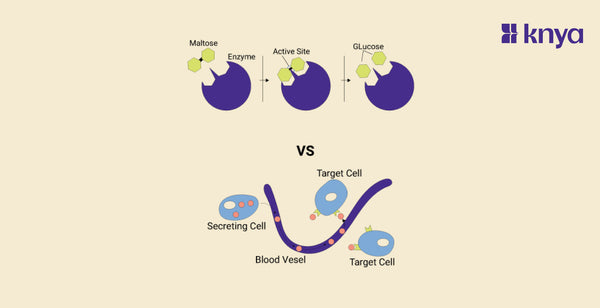Difference Between Hormone and Enzyme: In the intricate orchestra of the human body's biochemical processes, hormones and enzymes play distinct yet vital roles. Understanding the difference between these two biological entities is key to unraveling the complexities of physiological regulation. Here's a concise overview:
Difference Between Hormone and Enzyme
Here's a table summarizing the key differences between hormones and enzymes:
|
Feature |
Hormones |
Enzymes |
|
Nature of Function |
Chemical messengers regulating various physiological processes. |
Biological catalysts facilitating and accelerating chemical reactions. |
|
Production and Release |
Produced by endocrine glands, released into the bloodstream, and travel to target cells or organs. |
Produced by cells throughout the body, functioning locally at the site of the reaction. |
|
Specificity of Action |
Exhibit specificity towards target cells or organs with specific receptors. |
Show specificity for the reactions they catalyze, promoting biochemical transformations. |
|
Temporal Dynamics |
Often elicit slower, prolonged responses, orchestrating long-term physiological changes. |
Facilitate rapid reactions, exerting immediate effects in various cellular processes. |
|
Regulation Mechanisms |
Regulated by feedback loops adjusting hormone levels based on the body's needs and external stimuli. |
Subject to regulation through factors like substrate concentration, cofactors, and allosteric modulation. |
|
Speed of Action |
Generally elicit slower, prolonged responses due to systemic regulation. |
Facilitate rapid reactions, exerting immediate effects in various cellular processes. |
|
Duration of Action |
Effects may last for an extended period, influencing long-term physiological changes. |
Effects are transient, lasting only as long as the enzyme is actively catalyzing a reaction. |
|
Location of Action |
Systemic, affecting the entire body or specific organs. |
Localized, acting at the cellular level or within specific tissues. |
Check out Navy Blue Scrubs for Mens
What is Hormone
A hormone is a signaling molecule produced by glands in the endocrine system that regulates various physiological processes in the body. These molecules act as messengers, facilitating communication between different cells and organs. Hormones are crucial for maintaining homeostasis, coordinating growth and development, influencing metabolism, and regulating responses to stress, among other functions.
Key points about hormones include:
- Production: Hormones are produced by specialized glands, such as the pituitary gland, thyroid gland, adrenal glands, and pancreas. These glands release hormones into the bloodstream.
- Transport: Once released into the bloodstream, hormones travel to target cells or organs located throughout the body. The circulatory system serves as a delivery system for these chemical messengers.
- Target Cells: Hormones exert their effects by binding to specific receptors on the surface of or inside target cells. These receptors are like locks, and hormones act as keys that fit into these locks, initiating a cellular response.
- Regulation: The endocrine system operates through intricate feedback loops that help maintain the balance of hormones in the body. Hormone levels are carefully regulated to ensure that physiological processes occur at optimal levels.
- Diversity: There are various types of hormones, including peptides, steroids, and amino acid derivatives. Each type has a specific structure and function.
- Functions: Hormones play a role in a wide range of functions, such as controlling metabolism, regulating blood sugar levels, influencing growth and development, managing stress responses, and maintaining reproductive health.
Examples of hormones include insulin, which regulates blood glucose levels; thyroid hormones, which influence metabolism; cortisol, involved in the stress response; and sex hormones like estrogen and testosterone, which play a role in reproductive processes.
Get Best Quality Lab Coats for Students here!
What is Enzyme
An enzyme is a biological molecule, typically a protein, that functions as a catalyst to facilitate and accelerate chemical reactions within living organisms. Enzymes play a crucial role in various cellular processes by lowering the activation energy required for a specific reaction to occur. In other words, enzymes make it easier for reactions to take place without being consumed or altered themselves.
Key features of enzymes include:
- Catalytic Activity: Enzymes speed up chemical reactions by providing an alternative pathway for the reaction to occur more rapidly.
- Substrate Specificity: Enzymes are highly specific, each one designed to catalyze a particular reaction or group of similar reactions. The substance upon which an enzyme acts is called the substrate.
- Active Site: Enzymes have an active site, a region with a specific three-dimensional shape that binds to the substrate. This interaction between the enzyme's active site and the substrate is often compared to a lock and key.
- Reaction Specificity: Enzymes can be involved in a wide range of reactions, including breaking down large molecules (catabolism), building up complex molecules (anabolism), and facilitating other cellular processes.
- Reaction Reversibility: Enzymes generally do not change the equilibrium of a reaction; they accelerate reactions that would occur naturally in both the forward and reverse directions.
- Regulation: The activity of enzymes can be regulated by various factors, including the concentration of substrates or products, temperature, and pH levels. This ensures that biochemical processes are finely tuned to the needs of the organism.
Examples of enzymes include amylase, which breaks down starch into sugars; DNA polymerase, responsible for synthesizing DNA during replication; and catalase, which catalyzes the breakdown of hydrogen peroxide in cells.
Check out Best Scrubs collection here!
Similarity Between Hormone and Enzyme
Hormones and enzymes, despite serving different roles in the body, share some similarities in their functions and characteristics:
- Biological Molecules: Both hormones and enzymes are biological molecules essential for the proper functioning of living organisms.
- Specificity: Both hormones and enzymes exhibit specificity in their interactions.
- Hormones: Are specific to particular target cells or organs with receptors recognizing their molecular structure.
- Enzymes: Are specific to certain reactions, promoting the conversion of specific substrates into products.
- Regulation: The activities of both hormones and enzymes are subject to regulation.
- Hormones: Are regulated by feedback loops adjusting hormone levels based on the body's needs.
- Enzymes: Are regulated by factors such as substrate concentration, cofactors, and allosteric modulation to maintain cellular homeostasis.
- Crucial for Homeostasis: Hormones and enzymes play vital roles in maintaining homeostasis within the body.
- Hormones: Regulate and coordinate various physiological processes to keep the internal environment stable.
- Enzymes: Facilitate biochemical reactions that contribute to cellular and metabolic balance.
- Essential for Life: Both hormones and enzymes are integral to the overall health and proper functioning of organisms.
- Hormones: Regulate growth, development, metabolism, and other systemic processes.
- Enzymes: Facilitate and accelerate biochemical reactions necessary for cellular activities and life processes.















